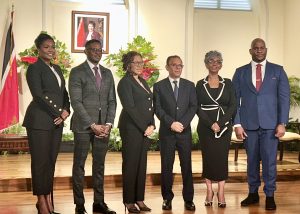Caption: Minister of Agriculture and Fisheries Ravi Ratiram
By Sue-Ann Wayow
SOME 30,000 pounds of cassava have been produced from a cassava yield trial hosted at Pinda Trace, Rio Claro.
Minister of Agriculture Ravi Ratiram lauded the ground-breaking yield as a major leap forward for local food production and the expansion of the cassava industry in Trinidad and Tobago, a release from the ministry on Sunday stated.
The trial is being led by the Caribbean Agricultural Research and Development Institute (CARDI) in partnership with the Ministry of Agriculture and Fisheries’ Research Division and the University of the West Indies (UWI).
This figure represents a significant improvement from the traditional national average of 20,000 lbs per acre, without heavy reliance on agrochemical inputs, the ministry stated.
Ratiram described the achievement as “a scientific and economic milestone” for Trinidad and Tobago’s drive toward food and nutrition security.
He said, “This research proves that with the right practices and collaboration, we can produce more food locally, reduce our import bill and build a strong, sustainable cassava industry that benefits farmers, processors and consumers alike.”
The pioneering trial focused on the use of improved agronomic practices including:
- Bio-stimulants and compost
- Testing land preparation with and without limestone
- Reduced fertilizer inputs
- Growing under water-deficit conditions without irrigation
The release stated that despite being planted at the end of the rainy season and grown throughout the dry months, the cassava recorded exceptional performance, demonstrating resilience to climate variability and suitability for scaling up across major food-producing regions.
Ratiram promised to continue supporting the value chain through strengthening links with farmers to increase raw material supply, backward integration with processors, such as the NAMDEVCO cassava and flour manufacturing facility and expanding opportunities for large-scale market development in flour, starch and animal feed industries.
He applauded the participating research teams and farmer host Peter King, for their dedication in validating solutions that lower production costs and position cassava as a major commercial crop.
Ratiram said, “This kind of innovation is exactly what will empower our farmers and ensure our agricultural sector thrives under the challenges of changes in climatic conditions.”
The event featured remarks from CARDI, UWI, the MAF Research Division, and representatives of the Root Crop Farmers Association, before concluding with a field tour and the harvesting activity.
![]()












